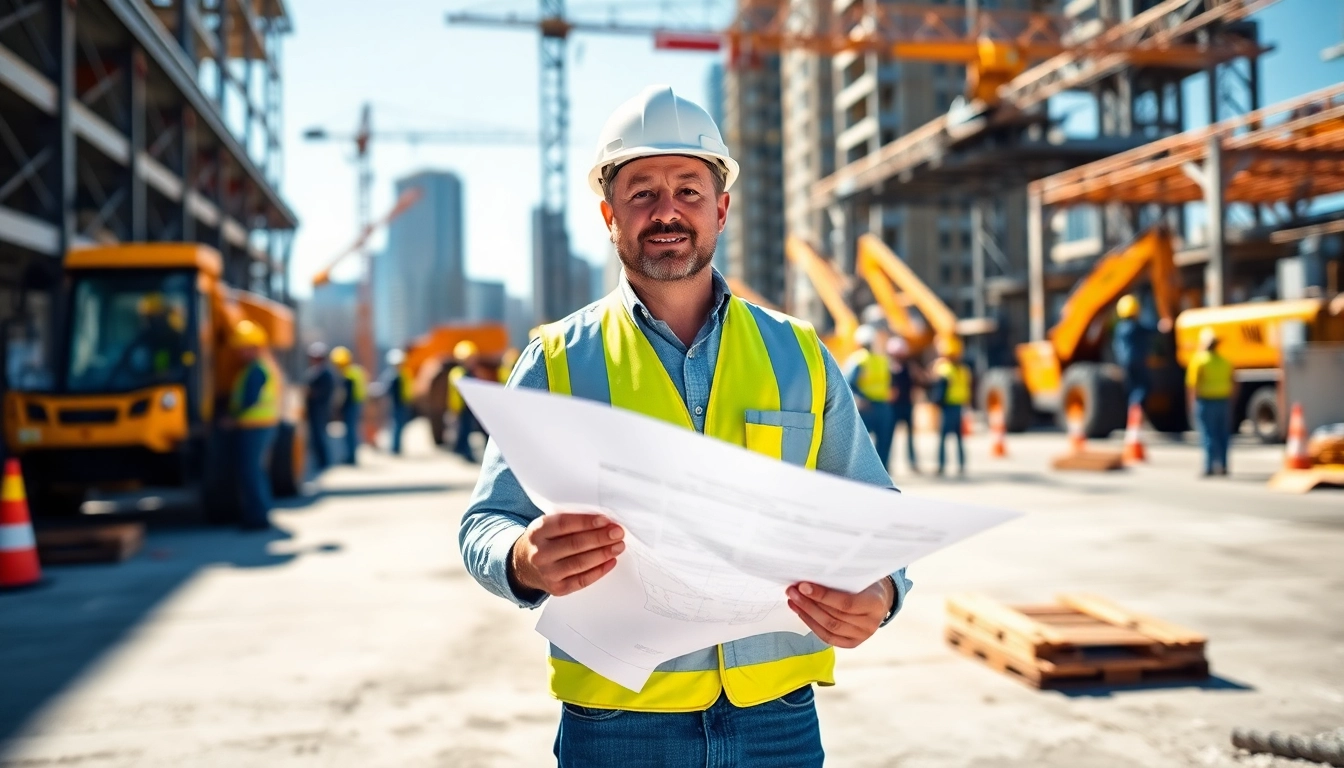Understanding the Role of a Manhattan General Contractor
When embarking on a construction project in New York City, it’s crucial to have a reliable Manhattan General Contractor who can navigate the complexities of urban construction. This article will cover the essentials of what a Manhattan General Contractor does, how to choose one, and the unique challenges of working in one of the busiest cities in the world. Understanding the role of a general contractor will empower you to make informed decisions that lead to a successful project.
What Does a General Contractor Do?
A general contractor (GC) acts as the main point of contact and management for a construction project, overseeing every aspect from start to finish. Their responsibilities encompass a wide range of tasks, including project planning, hiring subcontractors, acquiring permits, and ensuring compliance with safety regulations. They coordinate the workflow, making sure that all parts of the project come together smoothly.
In New York City, where building codes and regulations can be particularly stringent, a general contractor’s role becomes even more vital. They not only ensure that the construction adheres to local codes but also work to mitigate challenges that could arise during the construction process.
Importance of Licensing and Credentials
Licensing and credentials are important factors when selecting a general contractor. In New York, contractors must be licensed, and they should display their credentials prominently. Hiring a licensed contractor enhances the credibility of the project, ensuring compliance with legal requirements. Additionally, certifications from organizations such as the National Association of Home Builders (NAHB) or the Project Management Institute (PMI) indicate a commitment to professionalism and continued education in construction management.
Moreover, verified licenses are not only a sign of legitimacy but also protect clients from potential liabilities. Always verify the contractor’s licensing status before moving forward with agreements to ensure that your project is in capable hands.
Key Responsibilities on a Job Site
The responsibilities of a general contractor include myriad tasks that ensure the project proceeds as planned. Key responsibilities include:
- Project Coordination: Overseeing the daily operations and coordinating schedules among workers and subcontractors.
- Budget Management: Handling finances and ensuring that the project stays within budget by managing costs effectively.
- Quality Control: Ensuring that the work meets required specifications and quality standards.
- Safety Management: Enforcing safety protocols on the job site to protect all workers.
- Maintenance of Relationships: Building relationships with clients, subcontractors, and suppliers to foster a collaborative environment.
How to Choose the Right Manhattan General Contractor
Finding the right Manhattan General Contractor can significantly impact the success of your construction project. It’s essential to take proactive steps to assess their qualifications and compatibility with your project needs.
Assessing Experience and Specialization
Experience in the type of project you’re undertaking is crucial. Whether you’re planning a large commercial development or a residential remodeling, seek a contractor who has a proven track record in that area. Specialized contractors are often more familiar with the specific challenges and requirements, which can lead to more efficient project execution.
Don’t hesitate to ask for details regarding past projects. A reputable general contractor will be more than willing to provide references and examples of their previous work tailored to similar scopes and project types.
Evaluating Past Projects and Client Testimonials
Client testimonials and evaluations of former projects are crucial indicators of a contractor’s reliability and performance. Look for published reviews, ratings, and case studies that display their ability to fulfill contractual obligations and deliver quality work.
Pay attention to feedback regarding aspects such as communication, timeliness, budget adherence, and overall satisfaction. One great practice is to reach out directly to past clients to gain firsthand insights about their experiences.
Interview Questions to Ask Potential Contractors
To assess the qualifications of potential contractors effectively, prepared questions can guide your discussions. Here are some essential questions to consider:
- What is your experience with projects similarly scoped and designed?
- Can you provide a list of references from past clients?
- How do you handle project changes or unexpected challenges?
- What is your approach to budgeting and cost control?
- How do you ensure compliance with regulations and building codes?
Direct communication can reveal a lot about their professionalism and whether they are the right fit for your project needs.
The Process of Working with a Manhattan General Contractor
Once you find the right Manhattan General Contractor, the next steps involve a series of crucial actions to ensure the project is set up for success.
Initial Consultations and Project Planning
The first stage of working with a general contractor involves a detailed consultation to identify your project’s goals and objectives. During this stage, sharing your vision and preferences can guide the planning process, ensuring alignment between you and the contractor.
A reputable GC will often create a comprehensive plan that outlines specific phases of work, resource allocation, and an overview of timelines. Clear communication and comprehensive documentation at this stage will set a strong foundation for the entire construction process.
Budgeting and Cost Estimation
Understanding the project’s financial parameters is crucial. The general contractor should provide a thorough cost estimation that outlines expenses related to materials, labor, permits, and contingencies. Reviewing the budget collaboratively helps prevent unexpected costs later on. Use this opportunity to discuss financing options or strategies for effectively managing the budget throughout the project.
It’s also important to develop a payment structure. Common approaches involve milestone payments, which release funds upon the completion of specified phases in the project.
Timeline Development and Project Milestones
Developing a clear project timeline with milestones is essential for tracking progress. This timeline should outline critical phases and completion dates, establishing expectations for everyone involved in the project. Regular updates will help you gauge whether the project is staying on schedule and allow for necessary adjustments.
Using project management tools or software can enhance transparency and organization, helping the contractor and client maintain clear visibility over the timeline and responsibilities.
Common Challenges When Hiring a Manhattan General Contractor
Despite thorough planning and evaluation, challenges can still arise during a construction project. Understanding potential pitfalls can help you stay prepared and responsive.
Understanding Contractual Obligations
Contracts form the backbone of the client-contractor relationship. Misunderstanding contractual obligations can lead to disputes or project delays. Ensure contracts are comprehensive, covering aspects such as scope of work, payment terms, timelines, and provisions for any unexpected changes.
Additionally, consider consultation with a lawyer who specializes in construction law to review contracts before signing. This step is particularly important in Manhattan, where legalities can be intricate due to city regulations.
Navigating Permit and Regulation Issues
New York City has strict regulations and permit requirements that can be daunting. A capable general contractor should be adept at navigating these requirements on your behalf. Understanding which permits are needed and ensuring they are secured in a timely manner is a critical responsibility of the GC.
Failing to obtain the necessary permits can halt a project and lead to costly fines. Therefore, it’s essential to rely on your contractor’s expertise and experience in dealing with local authorities.
Maintaining Communication Throughout the Project
Effective communication is the linchpin to a successful construction project. Regular updates and open discussions between the contractor and clients help address issues early on. Establishing a preferred communication method helps both parties stay informed on progress, challenges, and modifications as needed.
Using apps or project management software can foster better communication. Frequent check-ins and updates can help to sustain a collaborative relationship, ensuring the project runs smoothly.
Evaluating the Success of Your Construction Project
After the project is completed, evaluating its success is essential for assessing performance and turnaround. This evaluation will also help inform future projects.
Performance Metrics to Consider
Monitoring specific performance metrics allows you to determine whether the project met its objectives. Key metrics might include:
- Budget adherence: Did the project stay within the allocated budget?
- Timeline adherence: Was the project completed on schedule?
- Quality: Did the construction meet predefined quality standards?
- Client Satisfaction: Were the client’s needs and expectations met?
Collecting data on these metrics can provide insights into the effectiveness of project management and execution.
Feedback and Continuous Improvement
After project completion, soliciting feedback from all parties involved can enhance future projects. Understanding what worked well and what could be improved is critical. This feedback loop should involve contractors, subcontractors, workers, and even clients, yielding valuable information to guide better practices in the future.
Using surveys or debrief meetings can set a foundation for continuous improvement, helping to foster stronger practices, relationships, and efficiency.
Building Relationships for Future Projects
Finally, successful project outcomes often lead to ongoing relationships. A great experience with a Manhattan General Contractor can pave the way for future collaborations. Nurturing these relationships through effective communication and demonstrated satisfaction can contribute not only to potential discounts on future projects but also to a smoother overall process.
Establishing a continuous partnership can lead to trust and a better understanding of project dynamics, ultimately resulting in improved outcomes for both parties.



